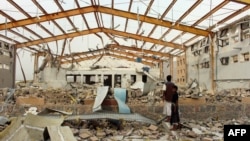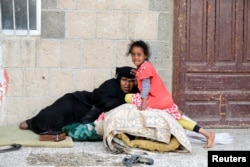U.N. Executive Director Henrietta Fore warns Yemen is on the brink of an abyss as the country’s devastating conflict pushes its economy, health, education, water and sanitation systems to the point of collapse. Fore has just returned from a four-day visit to Aden and Sanaa.
Yemen — which the U.N. calls the world’s worst humanitarian crisis — is likely to get even worse. The United Nations reports 22 million people are in need of assistance, and half of them are children. It says 80 percent of the population lives under the poverty line, 8.4 million are facing famine, and one child dies every 10 minutes.
UNICEF chief Henrietta Fore says more than half of health facilities have stopped working and others are barely functioning. She says many of the medical staff have not been paid for two years. Yet they come to work because they know there is a need.
She says 1,500 schools have been damaged due to airstrikes and shelling and are closed. Teachers also have not been paid and have stopped teaching the children. Fore says the water and sanitation system is broken, a situation that could lead to a resurgence of cholera and other diseases.
“So, as you can see, the social protection system, the health, the education and the water and sanitation are the key elements in any community, and if they collapse, all of us will have an enormous disaster on our hands," Fore said.
Fore says UNICEF, in partnership with other organizations, is doing its best to keep these vital systems afloat. She reports conditions in the port city of Hodeida are getting worse. The government-supported Saudi-led coalition began fighting in mid-June to wrest this vital port from the Houthi rebels.
The UNICEF chief reports 5,000 families have fled their homes in the past two weeks, supplies of basic commodities are dwindling, and prices are soaring. She says Hodeida was in the midst of several so-called days of tranquility while she was there. She says this temporary cease-fire was enacted to let peace talks led by U.N. Envoy for Yemen, Martin Griffiths continue.
Fore tells VOA that UNICEF has asked the warring factions to grant several days of tranquility in mid-July to allow vaccinations for children to take place.
“The vaccination program is very important for every aspect of a child’s life," Fore said. "The child mortality rates are very high in Yemen and we need to continue to immunize children, reach out to them with health and basic hygiene services.”
The U.N. reports at least 2,200 children have been killed and 3,400 injured since the Saudi coalition began its air campaign against Houthi rebels in March 2015 in support of the government. UNICEF’s Fore says peace is the only way to stop the killings and turn Yemen back into a functioning society.





